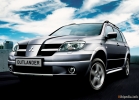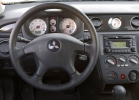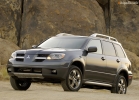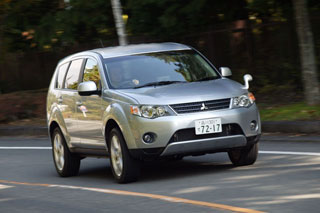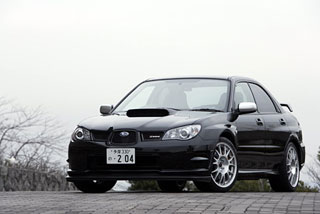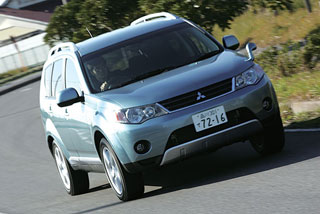Test drive Mitsubishi Outlander (Airtrek) 2003 - 2007 SUV
Comparative Mitsubishi Outlander test against Hyundai Santa Fe
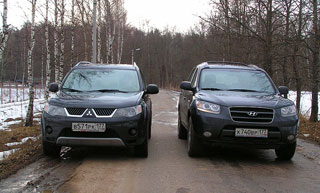 If in the battle against the Kia Sorento Hyundai Santa Fe was not confused and with the minimum superiority, as they say, he won his Korean counterpart by points, then this time the opponent of the SUV was much more serious. Mitsubishi Outlander XL, although a beginner, is still Japanese blood in his veins, and this is in a fight for leadership in this segment makes Mitsubishi a dangerous opponent.
If in the battle against the Kia Sorento Hyundai Santa Fe was not confused and with the minimum superiority, as they say, he won his Korean counterpart by points, then this time the opponent of the SUV was much more serious. Mitsubishi Outlander XL, although a beginner, is still Japanese blood in his veins, and this is in a fight for leadership in this segment makes Mitsubishi a dangerous opponent. In terms of appearance, it is definitely difficult to give preference to one of the applicants. The most beautiful Santa Fe element is the overall lights hung with milk-white stripes. In general, in the design of the machine there is not a single sharp line or an acute fracture of the surface, as if designers had pulled out a layout from a large piece of melting chocolate. The back is complemented by the overall image of a calm, quiet car, which is in no hurry and is ready for the degree movement both in dirt and asphalt. But Outlander XL looks like a strong life, who does not need a calm life at all, give him an active, even a little extreme rest. This is evidenced by the foreman of the front bumper put forward forward. Yes, and the posterior feet signals from the diodes give the appearance of a car of the mischievous shine.
As you know, the first stage of the fight is weighing. Our rivals are in the same weight category. The Korean athlete weighs 1750 kg against 1650 kg of the Japanese athlete. The applicants are almost the same in length: Santa Fe is 10 cm longer (4650 mm), it also arranges Outlander XL in width: 1890 mm versus 1800 in the Japanese, and in height 1725 mm versus 1720. But despite the fact that the Korean SUV looks more and looks more and More massive, its clearance is smaller: 201 mm versus 215 mm in Mitsubishi. Not so much an advantage, but still.
An interview before the battle will show the inner world of fighters. According to the description of manufacturers, it should be equally chic, in fact, everything looks somewhat different. The Hyundai torpedo is made of hard plastic, which is not appropriate for a car for more than $ 40,000. Both cars do without a rain sensor, however, its absence that on one car, which is absolutely imperceptibly and does not cause discomfort. It is unpleasant that the glasses of the Korean SUV can be neither lowered nor raised with one clip press, in Mitsubishi there is no this shortage.
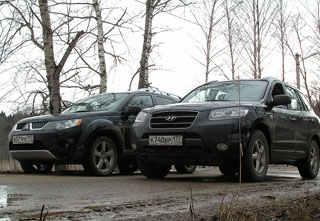 The Japanese is added by the excellent Rockford Fosgate Accoustic audio system with 8 speakers and a subwoofer and the excellent quality of the internal assembly. So, for example, a box above the glove compartment (by the way, with cooling designed for a bottle of water) to find not so just so evenly adjusted to each other all the elements of the cabin. Hyundai with music is worse, the radio is not a native radio and you have to shoot and hide the panel that after some time it starts to bother. True, the Korean fighter is trying to compensate for this drawback by the presence of a DVD player with a remote control for the rear passengers. Therefore, if you use the services of a personal driver, then such a DVD thing is very comfortable and useful.
The Japanese is added by the excellent Rockford Fosgate Accoustic audio system with 8 speakers and a subwoofer and the excellent quality of the internal assembly. So, for example, a box above the glove compartment (by the way, with cooling designed for a bottle of water) to find not so just so evenly adjusted to each other all the elements of the cabin. Hyundai with music is worse, the radio is not a native radio and you have to shoot and hide the panel that after some time it starts to bother. True, the Korean fighter is trying to compensate for this drawback by the presence of a DVD player with a remote control for the rear passengers. Therefore, if you use the services of a personal driver, then such a DVD thing is very comfortable and useful. The seats are adjusted that one car has an electric drive for the driver, there is no electric drive for a passenger. In general, the salon of the Japanese applicant looks more solid and pleasant, except that the heating buttons of seats are located very uncomfortable, to the right of the driver's seat, in the crack between the pillow of the chair and the beard. But the Japanese also has disadvantages. For example, the third row of seats on Outlander XL will not be installed for Russia, since it was donated for the sake of a full -sized spare wheel, which is located under the bottom. The installation technology is such that between these very important elements had to be chosen, and the wheel won. In terms of trunk, competitors are 774 liters, if you do not fold the seats, except that Hyundai has the second bottom of the trunk, in which, for example, you can carry smuggling.
When it reaches the combat effectiveness tests, Outlander XL simply destroys its competitor. Mitsubishi is equipped with a 3.0 -liter engine that outstanding 220 hp power, but Santa Fe boasts only by the 2.7 (189 hp) engine. And on the behavior of cars, this difference in power affects very much. Hyundai is an old sea wolf that has seen a lot in his lifetime, he has nowhere to rush, his maximum speed is 179 km/h, and he will get to the coveted mark of 100 km/h after 11.7 seconds. Outlander XL Young Jung, who dreams of becoming a captain, he is ready to take on any business, moving frantically from one place to another. The maximum speed of the Japanese reaches 200 km/h, and he tears a hundred in just 9.7 s.
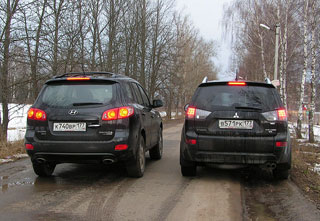 But here it all depends on the character of the owner: a calm, adult who is accustomed to sedately travel through the streets, without looking with annoyance at the watch, Santa Fe is perfect. Everything is measured here: the brake pedal is moderately tight, the reaction to the steering wheel is exactly what you expect to see on the SUV. In general, a ship for moving around the city and easy off -road. Outlander XL is designed for an active driver. It must be a pleasure to maneuver at speeds, but not on studded rubber, which was installed on a test sample. On the spikes along the dry road, the car is not very confident. And an acute reaction to the steering wheel is surprising in any way, you do not expect to get such controllability from an unsportsmanlike car. You have to even get used to how the car behaves, however, just an hour later it begins to give great pleasure. In addition to everything, automatic gearbox in manual mode provides honest switching, that is, until the driver selects increased gear, it will not switch. Only Infiniti FX 45 behaves, and a comparison with such a car means a lot. On Santa Fe there is a standard machine, which only confirms its reputation as a calm car: no jerks, no sharp accelerations are all extremely measured and smooth.
But here it all depends on the character of the owner: a calm, adult who is accustomed to sedately travel through the streets, without looking with annoyance at the watch, Santa Fe is perfect. Everything is measured here: the brake pedal is moderately tight, the reaction to the steering wheel is exactly what you expect to see on the SUV. In general, a ship for moving around the city and easy off -road. Outlander XL is designed for an active driver. It must be a pleasure to maneuver at speeds, but not on studded rubber, which was installed on a test sample. On the spikes along the dry road, the car is not very confident. And an acute reaction to the steering wheel is surprising in any way, you do not expect to get such controllability from an unsportsmanlike car. You have to even get used to how the car behaves, however, just an hour later it begins to give great pleasure. In addition to everything, automatic gearbox in manual mode provides honest switching, that is, until the driver selects increased gear, it will not switch. Only Infiniti FX 45 behaves, and a comparison with such a car means a lot. On Santa Fe there is a standard machine, which only confirms its reputation as a calm car: no jerks, no sharp accelerations are all extremely measured and smooth. As for gluttony, then the appetite of the Japanese is abruptly, which is not surprising. In the city cycle, Outlander XL can eat 17-18 liters of 95 gasoline, while the Hyundai is limited to only 15. With uniform movement along the highway, cars are the same for fuel needs: about 10 liters per 100 km of path.
And finally, the last round of the fight: off -road. I must say, both applicants pleased here. The new Mitsubishi, in contrast to his smaller counterpart of the usual Outlander, is connected all -wheel drive, with the ability to ride 4L, that is, on reduced gear. Santa Fe has a constant all -wheel drive with the ability to drive low gear. Both cars on the field, on which wet clay mixed with melt snow, showed themselves from the best side. Perhaps Hyundai was still a little better, but not much. Outlander XL confidently twisted a span in the snow, but he was not to his liking clay.
The knockout did not work again, this time Santa Fe, perhaps, did not lose much. Although both cars cost the money that they ask for them, but if you add another 2500 to the maximum equipment of the Korean by the maximum equipment, then for 44,990 you can purchase Outlander XL stuffed to the limit. Anyone who has forced herself for extra money will receive a more modern salon, sports character of the car and a pleasant appearance. And the one who does not want to overpay will receive a calm car, which is pleasant to use for long trips and for a promenade around the city. And although Mitsubishi Outlander XL won in a specific battle, there is also something to be proud of.
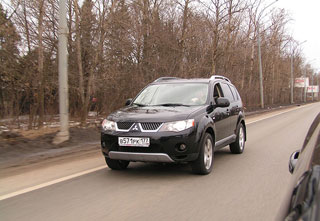
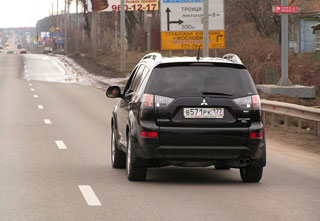
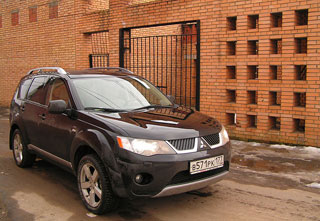
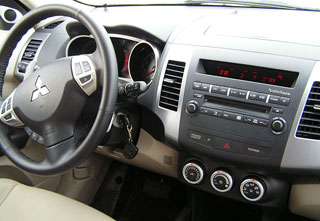
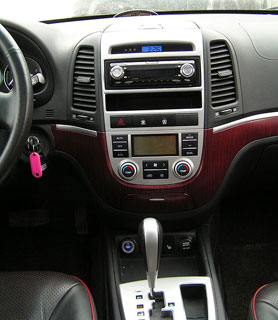
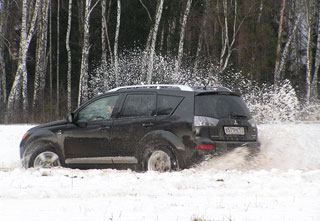
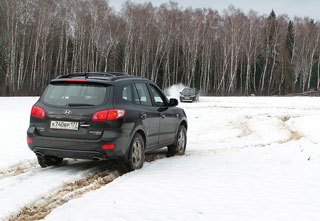
Nikolai Kavvozdkin
Autonews.ru
Source: Drom.ru
Video Crash tests Mitsubishi Outlander (Airtrek) 2003 - 2007
Test drives Mitsubishi Outlander (Airtrek) 2003 - 2007
Mitsubishi Outlander (Airtrek) 2003 - 2007
Mitsubishi Outlander malfunctions: Detailed information| Outlander (Airtrek) 2003 - 2007 | |
|---|---|
| Engine |  |
| Transmission |  |
| Control system and suspension |  |
| Brake system |  |
| Air heating and air conditioning |  |
| Launch and charging system |  |
| Electric components and so on |  |
| Corrosion body stability |  |


